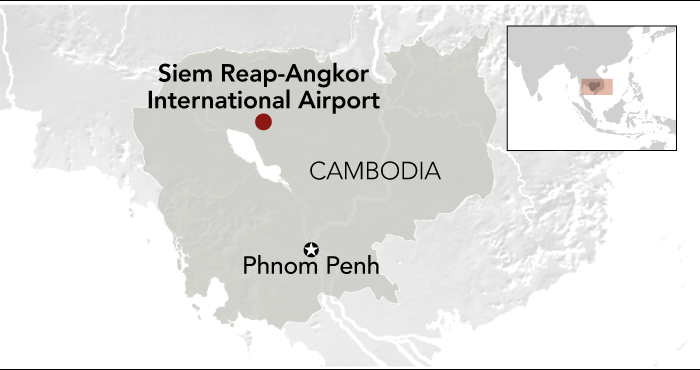Unlock the Editor’s Digest for free
Roula Khalaf, Editor of the FT, selects her favourite stories in this weekly newsletter.
Planes have begun landing at a new Chinese-built airport near the city of Siem Reap, the latest symbol of how Cambodia is pinning its hopes for infrastructure investment on its political and economic patron.
The Siem Reap-Angkor International Airport, built over three years at a cost of about $1bn, began operations last week ahead of its official inauguration next month.
Cambodia has received billions of dollars in infrastructure funding from China. Much of it, including the new airport, has come under the banner of the Belt and Road Initiative (BRI), the overseas infrastructure-building project that Chinese president Xi Jinping has nurtured over the past decade.
Attending a BRI forum in China last week, Cambodian prime minister Hun Manet signed several memorandums of understanding about potential projects.
Hun Manet met top political officials and representatives of state-owned companies, including China Machinery Engineering, China National Energy Engineering & Construction, China Datang, Genertec International and China Railway Construction.

This article is from Nikkei Asia, a global publication with a uniquely Asian perspective on politics, the economy, business and international affairs. Our own correspondents and outside commentators from around the world share their views on Asia, while our Asia300 section provides in-depth coverage of 300 of the biggest and fastest-growing listed companies from 11 economies outside Japan.
Subscribe | Group subscriptions
The meetings covered plans to invest in renewable energy, the gas sector, a data management centre, water supply upgrades and new rail links.
Speaking with China Railway Construction chair Wang Jianping, Hun Manet discussed modernising Cambodia’s existing rail network and connecting it to the city of Bavet on its eastern border with Vietnam, and with the tourist hub of Siem Reap.
Hun Manet also met Li Kuo, chair of China Metro Group, which is interested in building light-rail connections to the Siem Reap airport and another under construction in Phnom Penh.
“The Belt and Road Initiative has been instrumental in providing many developing countries, including Cambodia, with numerous advantages such as the development of physical infrastructure, increased foreign direct investments, economic growth, regional and global integrations and people-to-people exchanges,” Hun Manet said in a speech at the event.
The new 700-hectare airport is about 40km from Siem Reap and was developed by a consortium of state-owned companies from China’s Yunnan province. The consortium will run the facility under a 55-year build-operate-transfer deal.

It was built to handle 7mn passengers a year, with potential for expansion, and serves as the gateway to the Angkor Wat temple complex, Cambodia’s biggest tourism draw. The country has been attempting to win back visitors after years of Covid-related disruption, including with a campaign focused specifically on Chinese tourists.
The airport replaces one run by French conglomerate Vinci, which was just 5km from the world heritage-listed site, a proximity that presented problems, said Sinn Chanserey Vutha, a spokesperson for Cambodia’s State Secretariat of Civil Aviation.
These included a difficult approach path for pilots during some months and concerns that increasing the number of flights could impact the temples.
It was also too close to residences to allow for expansion, necessitating the move to another site, whose distance from Siem Reap was in line with international norms, Vutha said. Tokyo’s Narita airport, he pointed out, is even further from the centre of the city it serves.
To move forward on the Siem Reap airport, the government had to end the agreement governing operation of the previous facility many years early.
The previous facility was run by Cambodia Airports, 70 per cent owned by Vinci Airports and 30 per cent by a Malaysian-Cambodian joint venture. Vutha said a committee set up to sort out compensation awarded $63mn for the early termination.
The new operator, Angkor International Airport Investment, is a consortium of Yunnan Investment Holdings, Yunnan Construction Investment Group and the Yunnan Airport Group. The consortium was also given control of the old airport, but Vutha said it had yet to propose another use for the site.
Vinci had operated all of Cambodia’s international airports — in Phnom Penh, Siem Reap and Sihanoukville — under concessions awarded in the 1990s that were supposed to run until 2040.
Its concession in Phnom Penh is also likely to be cut short, with a new $1.5bn airport overseen by local conglomerate Overseas Cambodia Investment expected to come online in 2025.
Vutha said Vinci was in discussions with Cambodia Airport Investment, the special project vehicle in charge of the development, about whether they would play a role in the future facility.
“These are [business-to-business] discussions. How far they reached, we don’t know,” he said.
Cambodia Airports spokesperson Norinda Khek said it was continuing with further development of the Sihanoukville site and had “engaged in constructive dialogue with involved parties on the new Phnom Penh airport project”.
A version of this article was first published on October 24 by Nikkei Asia. ©2023 Nikkei Inc. All rights reserved.

